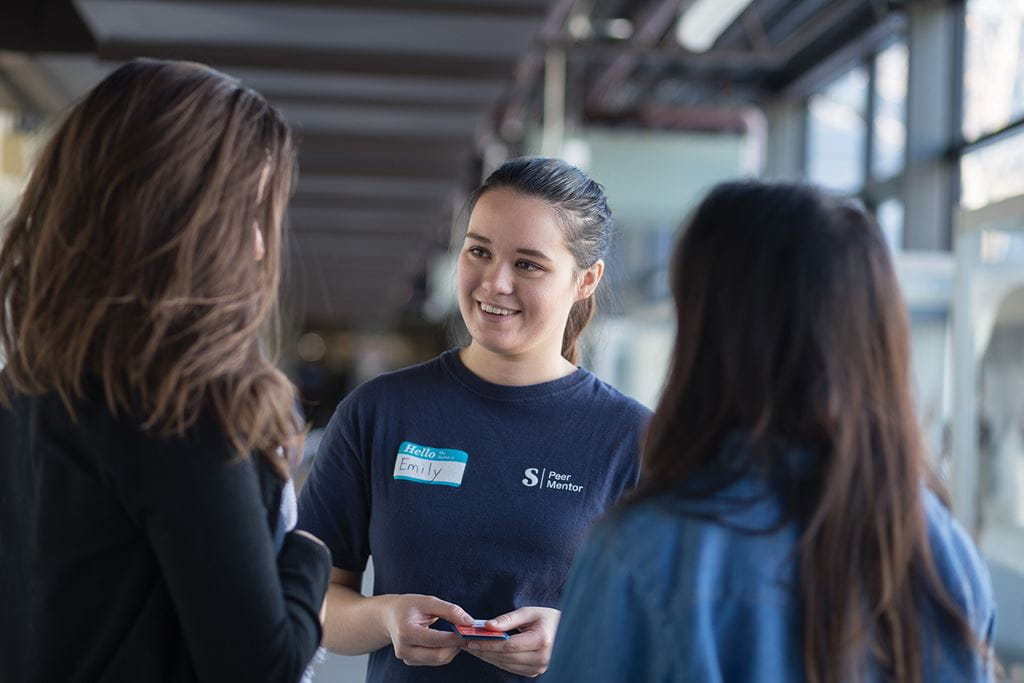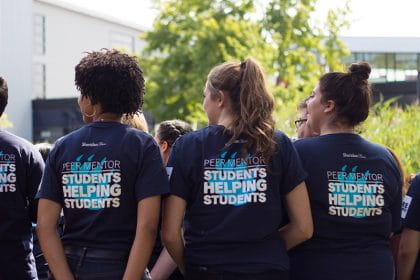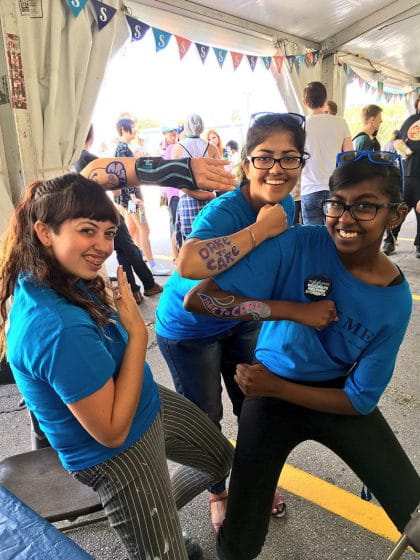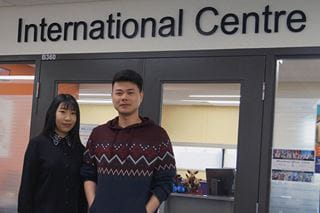
Students helping students: Sheridan’s Peer Mentor program
 by Jon Kuiperij – Jan 7, 2019
by Jon Kuiperij – Jan 7, 2019 Student Advisement. Accessible learning. International. Indigenous Learning and Support. Student Rights and Responsibilities. Health Services. Counselling. Athletics and Recreation. The list of support services that Sheridan offers its students goes on and on.
But what happens when students aren’t aware of all the services available to them or when they’re reluctant to access them? “An assumption that we can have as an institution is that if we build it, they will come. We build these offices and (expect) the students will have courage to walk through the doors and say, ‘I need help,’” says Sunand Sharma, Sheridan’s Manager of Student Rights and Responsibilities. “That may work for 20 per cent (of students). They say the upper 20 per cent doesn’t need (help). But what about the 60 per cent in between?”

That’s where Sheridan’s Peer Mentor program comes in.
For nearly two decades, Peer Mentors have served as a bridge between Sheridan’s support service departments and the student population. Guided by the philosophy of ‘students helping students’, Peer Mentors also help newcomers settle into life at Sheridan by fostering a sense of belonging and encouraging engagement on campus.
“During orientation, the first thing new students want is to meet their faculty and understand their programs, and the second thing they want is to make friends,” says Natalie Fasano, Sheridan’s Co-ordinator of Student Leadership and Engagement. “I look at this program as being transformational in that way for a lot of students. Our Peers understand that and are encouraged to go out to find people who may need that friendship.”
“As a first-year student, the biggest challenge I faced was simply that I was unsure where or who to ask a question I might have had,” adds Human Resources Management student Fransiscus Dharmady Idris, who spent five years as a Peer Mentor. “Many students tend to feel more comfortable speaking and/or sharing their struggles with someone who is in a similar position — a peer or fellow student — rather than a teacher or staff member.”
Ensuring program quality and commitment
Founded in 1999, Sheridan’s Peer Mentor program is one of the oldest college programs of its kind in Ontario. It’s also one of the few post-secondary Peer Mentor programs in the province that pay their employees, rather than offering an honourarium or a course credit.

Ensuring Peer Mentors are paid was a point of emphasis for program co-founder Maria Lucido Bezely, who convinced student government to approve an ancillary fee to help fund the program. “We needed to have expectations that the quality of mentoring would be there and that we would hold ourselves accountable to it,” says Lucido Bezely, who is now Sheridan’s Dean of Students. “Also, most students receive some form of financial aid and can’t volunteer because they’re already working part-time.”
The opportunity to make money working a flexible schedule on campus attracts hundreds of applications for Peer Mentor positions each year. The recruitment process is structured and rigorous, requiring all candidates to be entering at least their second year of studies and to own a GPA of 3.0 or higher. After interviews are conducted and job offers are made, successful candidates must then complete 10 hours of online training and a weekend of orientation, ensuring they’re prepared to assist new students when the fall semester begins in September.
“They have to be committed to get the job,” says Fasano, noting that Sheridan caps the weekly workload at 10 hours to ensure Peer Mentoring doesn’t interfere with a student’s own studies. “Then we offer professional development throughout their time (as a Peer Mentor). We’re not only tracking their impact on the community and Sheridan as an institution, we’re also tracking the employability skills that the Ministry (of Training, Colleges and Universities) wants all post-secondary students to have developed before they graduate.”
Developing valuable leadership skills
Development of those skills explains why the majority of students who have worked as Peer Mentors at Sheridan have gone on to enjoy success in the workforce, many of them in leadership positions.
“I feel the biggest thing that I benefitted from was the huge push to make decisions and to do things on our own. Yes, I had a boss who’d tell me what to do, but within reason,” says Sheridan grad Akita Chacia’Costa, who served as a Peer Mentor for three years and now works as a freelance graphic designer and illustrator. “It was almost in a sense like running our own mini-business. It really pushed us to work outside of our comfort zones and not be constantly seeking approval.”
I have been able to become more extroverted, more comfortable in leaving my shell, a stronger communicator, a better and more effective leader, and a more well-rounded person.” – Peer Mentor Fransiscus Dharmady Idris
Adds Dharmady Idris: “I have been able to become more extroverted, more comfortable in leaving my shell, a stronger communicator, a better and more effective leader, and a more well-rounded person. I would absolutely recommend others to work as a Peer Mentor because it not only gives you valuable work experience that can be relevant to your program and future career, but the lifelong connections and relationships you have the chance to build are absolutely amazing.”
Feedback like that is music to the ears of the program’s co-founder. “We’re doing this in ways that are very intentional in preparing our students for success beyond,” says Lucido Bezely. “It’s all part of that scaffolding and development of the individual. I’m very excited about that, because this is a great experience.”
Pictured at top of page: A Peer Mentor named Emily speaking to students at the Trafalgar Campus.
Written by: Jon Kuiperij, Marketing Copy and Content Writer at Sheridan.
Media Contact
For media inquiries, contact Sheridan’s Communications and Public Relations team.



